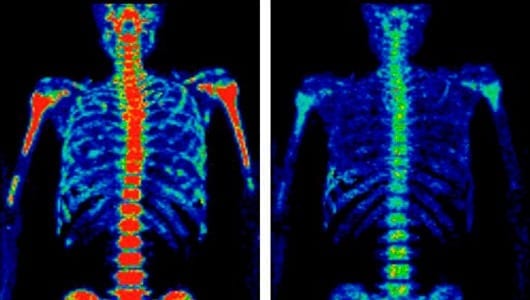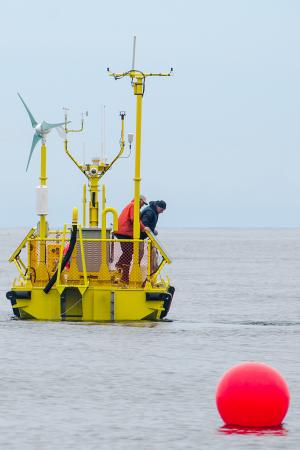
Researchers at the University of B.C. say they’ve averted a looming medical isotope shortage by proving they can produce enough of the chemical element used in life-saving cardiac and cancer scans to stop using nuclear plants.
The breakthrough research means aging nuclear power plants — plagued with leaks, high maintenance costs and problems disposing toxic waste — will likely be replaced with cyclotrons, a particle accelerator the size of an SUV, in hospitals starting as early as next year.
A team including UBC scientists has been working on finding a solution for more than five years, and TRIUMF, Canada’s national laboratory for particle and nuclear physics, announced last year that it had found an alternative by using cyclotron-based production of isotopes.
Now UBC says the cyclotron has produced enough isotopes in six hours to conduct about 500 scans — beating the previous record almost fourfold. It was the amount needed to prove that this could be a practical solution for the looming national threat of a medical isotope shortage.
The aging National Research Universal Reactor near Chalk River, Ont., is set to retire in 2016. It produces the country’s main source of medical isotopes, technetium 99m (Tc99m) — a diagnostic isotope used in medical scans.
Cyclotron-based production of Tc99m would provide a solution to shift away from reactor based production of isotopes, while providing a safe and secure supply for Canadian patients, the researchers say.
Read more: Breakthrough UBC research finds cleaner, safer source of medical isotopes than nuclear power plants
The Latest on: Medical isotopes
[google_news title=”” keyword=”Medical isotopes” num_posts=”10″ blurb_length=”0″ show_thumb=”left”]
via Google News
The Latest on: Medical isotopes
- An invitation to visit one of the world’s largest nuclear sites in Tivertonon May 9, 2024 at 1:44 pm
Want to visit one of the world’s largest nuclear sites? Registration is now open as Bruce Power gears up for another summer at the Visitors’ Centre, that includes a narrated bus tour with details ...
- Geology Finds a Role in Cancer Researchon May 8, 2024 at 5:02 am
Normally used to study Earth's history, hydrogen isotopes—and the techniques used to spot them—are now cluing scientists in to early signs of cancer.
- BWX Technologies, Inc. (NYSE:BWXT) Q1 2024 Earnings Call Transcripton May 7, 2024 at 8:09 am
Q1 2024 Earnings Call Transcript May 6, 2024 BWX Technologies, Inc. beats earnings expectations. Reported EPS is $0.746, expectations were $0.67. BWX Technologies, Inc. isn’t one of the 30 most ...
- Unique atomic fingerprint of cancer cells discovered in hydrogen atomson May 7, 2024 at 6:53 am
Geologists and biologists use earth science tools to identify cancer's unique atomic markers known as fingerprints.
- Scientists Reveal Cancer's Atomic Secrets—'Whole New Layer to Medicine'on May 7, 2024 at 5:44 am
By studying these ratios in yeast and mouse liver cells, the team found that cells that were growing extremely fast, similar to cancer cells, contained a noticeably higher ratio of hydrogen to ...
- ITM Appoints Dr. Danielle Meyrick as Chief Medical Officeron May 7, 2024 at 2:11 am
After a career spanning more than 45 years, Dr. Philip E. Harris will retire ...
- Geologists, biologists unearth the atomic fingerprints of canceron May 6, 2024 at 12:00 pm
Scientists at the University of Colorado Boulder and Princeton University have, for the first time, employed a tool often used in geology to detect the atomic fingerprints of cancer.
- Community Matters: Spreading the ‘isotopes for hope’ messageon May 4, 2024 at 12:40 am
Bruce Power is a proud member of the Canadian Nuclear Isotope Council (CNIC), a group of more than 85 members from across science, academia, health care and nuclear-sector organizations, all pulling ...
- Tweaking isotopes sheds light on promising approach to engineer semiconductorson May 3, 2024 at 9:41 am
Research led by scientists at the Department of Energy's Oak Ridge National Laboratory has demonstrated that small changes in the isotopic content of thin semiconductor materials can influence their ...
- Carbon-14 radioactive isotope enters mass production in Chinaon April 22, 2024 at 7:26 am
The mass production of carbon-14, as reported by state media’s China Science Daily, is being done at a commercial nuclear reactor in the eastern province of Zhejiang.
via Bing News









